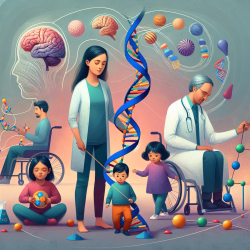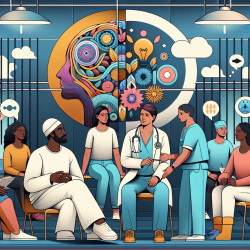Introduction
The COVID-19 pandemic has significantly impacted various aspects of healthcare, including medical education and residency training. A recent study titled "A cross-sectional survey study of the impact of COVID-19 pandemic on the training and quality of life of Italian medical residents in the Lombardy region" provides valuable insights into these changes. For practitioners, especially those involved in online therapy services like TinyEYE, understanding and implementing the outcomes of such research can enhance skills and improve outcomes for children.
Key Findings and Implications
The study highlighted several critical impacts of the pandemic on medical residents:
- Over 60% of residents reported a negative impact on their training, particularly in surgical skills due to reduced hospital capacity and elective surgeries.
- Conversely, 40% of residents involved in clinical duties perceived an improvement in their clinical competencies, especially those working in COVID-19 care.
- Virtual training methods were adopted by 80% of residency programs, although satisfaction with these methods varied.
- There was a significant reduction in quality of life aspects, including sleep, mood, and social relationships.
Implementing Research Insights
For practitioners, these findings offer several actionable insights:
- Adopt Virtual Learning: The shift to virtual training during the pandemic demonstrated the potential for online learning. Practitioners can leverage this by incorporating more digital resources and virtual sessions into their training and therapy practices.
- Focus on Clinical Competencies: The improvement in clinical skills reported by residents involved in COVID-19 care suggests that challenging environments can enhance competencies. Practitioners should seek opportunities for hands-on experience and problem-solving in real-world settings.
- Enhance Quality of Life: The decline in quality of life metrics among residents underscores the importance of well-being. Practitioners should prioritize self-care and support systems to maintain their mental and emotional health, ultimately benefiting their professional performance.
Encouraging Further Research
The study also emphasizes the need for ongoing research to understand the long-term impacts of the pandemic on medical training and quality of life. Practitioners are encouraged to contribute to this body of knowledge by engaging in research activities, sharing insights from their experiences, and advocating for studies that explore innovative training methods and their effectiveness.
Conclusion
The COVID-19 pandemic has reshaped the landscape of medical education and training. By understanding and implementing the insights from recent research, practitioners can enhance their skills, improve outcomes for children in therapy, and contribute to the evolving field of medical education. For those interested in delving deeper into the study, please read the original research paper: A cross-sectional survey study of the impact of COVID-19 pandemic on the training and quality of life of Italian medical residents in the Lombardy region.










